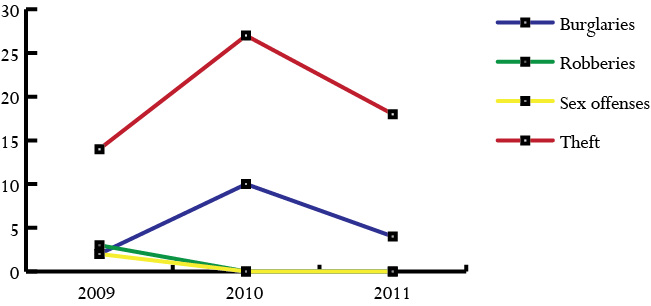Are students less safe on Kent campus?
September 26, 2011
Walking along the Esplanade, standing in line for food, fighting for parking places — it’s no secret that Kent State is at its highest enrollment ever. 27,855 students currently attend Kent State’s main campus — a 4.76 percent increase since last fall. With many more students around, students may question the safety of the campus.
Michquel Penn, the community resources officer for the campus police said that the department has added one more officer per shift. Six to eight officers are on shift patrolling the university 24 hours a day, seven days a week.
“We have officers patrolling at all times,” Penn said. “They could be in cruisers or walking. I don’t think students know how much officers walk the campus. Sometimes they’ll park a cruiser and just go on foot.”
Kent State police have added six officers in the last two years, which wasn’t a direct result of increasing enrollment, but a change they saw fit.
“I think it’s going to be more difficult for people to commit crimes because more people will be around and on campus,” said Alyssa Hodge, junior history major. “Burglaries and robberies tend to happen when less people are around and people are walking alone. I think the more people around, the fewer crimes might happen on campus.”
No one has reported a sex offense or robbery on campus this semester, but 18 thefts have been reported. The difference between robbery and theft is that robbery involves violence or threat of violence, and theft does not.
There were 27 thefts reported between Aug. 29 and Sept. 21 in 2010, which means thefts and robberies have both decreased since this time last year.
“The university was not able to properly accommodate the class last year, so what makes them think they can handle even more kids?” said Sam Stefl, senior integrated science major. “Kent is very safe for students who live on campus, but for those who commute and put in long hours at the library, it can be a little eerie sometimes late at night.”
Penn said that new programs like the Sexual Assault Response Team and a program called ALICE Class, which deals with what to do if there is an active shooter, are here to help students feel safer.
“These programs are to help students while they are here and to take with them after graduation,” Penn said. “They both deal with response options and what to do if something happened or would happen in the future.”
Contact Cassandra Beck at [email protected].

























